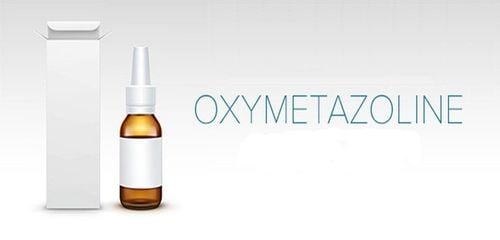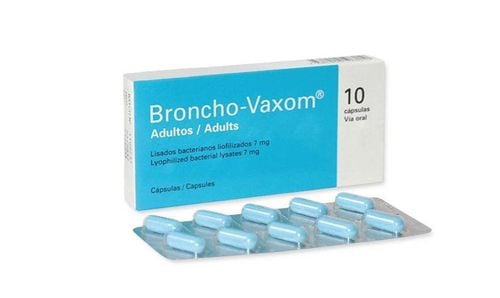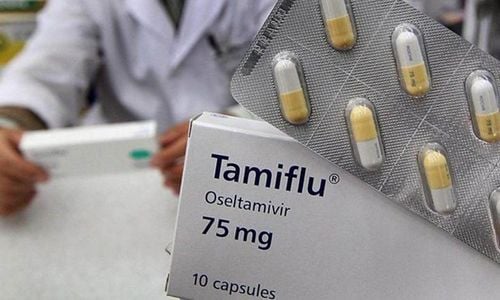This is an automatically translated article.
Allergies seriously affect the quality of life of patients, it causes symptoms of itchy eyes, runny nose. Antihistamines, specifically Medlicet, can help reduce allergy symptoms. So how does Medlicet work?
1. What is Medlicet?
Medlicet is an antihistamine that reduces the effects of the natural chemical histamine in the body. Histamine can produce symptoms of sneezing, itching, watery eyes, and runny nose. The drug's ingredient is Cetirizine dihydrochlorideMedlicet medicine is used to treat cold or allergy symptoms such as sneezing, itching, watery eyes or runny nose. Medlicet is also used to treat itching and swelling caused by chronic urticaria (hives).
2. What does Medlicet do?
When you have an allergic reaction, the immune system produces chemicals called histamine to fight the allergen, and this is what causes your symptoms.
Medlicet helps relieve these symptoms by blocking the action of histamine, so that symptoms do not develop.
Therefore, cetirizine can be used to treat many common allergy symptoms, including:
Runny nose Sneezing Itchy nose or throat Itching, watery eyes
3. Side effects of drugs
As with any medicine, you may experience some side effects while using Medlicet. The side effects of cetirizine do not require additional medical treatment and may go away normally as your body gets used to the medicine.
Drowsiness or fatigue Dry mouth Weakness Dizziness Dizziness Sore throat If side effects become bothersome, talk to your doctor about other options. Patients should also talk to their doctor before taking Medlicet if you are:
Allergic to any medications Take another prescribed medication Have kidney or liver disease Breastfeeding is not recommended . If you are pregnant, ask a medical professional before use. Medlicet passes into breast milk, the risk of side effects in the nursing infant cannot be excluded. Medlicet is excreted in human milk at concentrations ranging from 25% to 90% of measured plasma concentrations, depending on the time of sampling after administration. Therefore, caution should be exercised when prescribing Medlicet to women who are breastfeeding.
When taking Medlicet, alcohol, sedatives and tranquilizers can increase drowsiness, so these drugs should be avoided. Be careful when driving a motor vehicle or operating machinery.
When using Medlicet for children, you should also consult your doctor first if the medicine is intended for children under two years of age.
4. Usage and dosage of the drug
5.1. How to take Take this medication with or without food as directed by your doctor, usually every 4 hours as needed. If you are using the liquid form of this medication, measure the dose carefully using a special measuring spoon. Do not use a household spoon as you may not get the correct dose. This medicine works best if it is used when the first signs of a headache occur. This drug may cause withdrawal reactions. In such cases, withdrawal symptoms (such as nausea, mood swings, seizures) may occur if you suddenly stop using this medicine. To prevent withdrawal reactions, your doctor may reduce your dose gradually. Report any withdrawal reaction immediately. Along with its benefits, this drug can rarely cause abnormal drug-seeking behavior (addiction). This risk may be increased if you have abused alcohol or drugs in the past. Tell your doctor if you notice increasing use of this medicine, your headaches get worse, the number of headaches increases, the medicine doesn't work as well, or you use this medicine for more than 2 episodes. beginning of a week. Do not take more than recommended. Your doctor may need to change your medication or add a separate medication to prevent headaches. 4.2. Dosage Usual Adult Dose for Allergic Rhinitis : 5 to 10 mg orally or once a day
Usual Adult Dose for Urticaria : 5 to 10 mg orally or chewed once a day
Usual Dose for Urticaria Children for allergic rhinitis:
6 months to 2 years: 2.5 mg orally once a day, 12 months of age and older can be increased to 2.5mg orally twice a day. 2 to 5 years: 2.5 mg orally once daily, may increase to 5 mg/day in 1 to 2 divided doses. 6 years and older: 5 to 10 mg orally or chewed once a day. Usual Pediatric Dose for Urticaria:
6 months to 2 years: 2.5 mg orally once a day, 12 months of age and older may be increased to 2.5 mg orally twice a day. 2 to 5 years: 2.5 mg orally once daily, may increase to 5 mg/day in 1 to 2 divided doses. 6 years and older: 5 to 10 mg orally or chewed once a day.
5. Drug interactions
Due to the pharmacokinetics, pharmacodynamics and tolerability of Medlicet, there is no interaction with this antihistamine. In fact, neither pharmacodynamic nor pharmacokinetic interactions were reported in drug-drug interaction studies performed, particularly with pseudoephedrine or theophylline (400 mg/day).
In susceptible patients, the concomitant use of alcohol or other CNS depressants may cause further impairment of alertness and impaired functioning.
7. How to deal with the side effects of cetirizine
When you feel drowsy and tired while taking the medication, try another non-drowsy antihistamine. If you experience headaches as a side effect, make sure you rest and drink plenty of fluids, preferably not too much alcohol. You can inform your doctor about this condition to get a prescription for a pain reliever. In case of dry mouth, the patient can chew sugar-free gum or suck on sugar-free sweets. If Medlicet makes you feel dizzy when you stand up, try getting up slowly or sitting down until you feel better. If you start to feel dizzy, lie down so you don't faint, then sit until you feel better. Do not drive, cycle, or use tools or machines if you feel dizzy or slightly shaky. Diarrhea: Drink plenty of water or other fluids if you have diarrhea. Do not take any other medicines to treat diarrhea without first talking to your pharmacist or doctor. Sore throat: Patients 16 and older can try gargling with an aspirin solution (1 aspirin tablet dissolved in half a glass of water) or using a pain-relieving mouthwash such as Oraldene. If your symptoms persist for more than a week, consult your pharmacist or doctor. Children under the age of 16 should not take aspirin.
Please dial HOTLINE for more information or register for an appointment HERE. Download MyVinmec app to make appointments faster and to manage your bookings easily.













